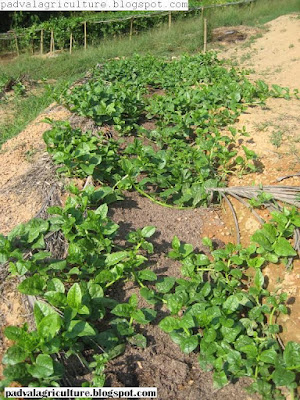We grow Spinach on the ground and not on a trellis during summer season. following are the methods we employ in cultivation of Indian spinach Basella alba (basale soppu, valchi bajji)
selection of land
- land selected must have good irrigation facilities
- Should get plenty of direct sunlight and no shade
- Loamy soils preferred with good drainage
- soils which were previously used for growing vegetables also can be used
- long trenches around 5 feet wide & up to 3 feet in depth are made and the soil is ploughed manually well to remove weeds, break clods & remove stones and other inert materials
- in each trench, approximately 20 to 30 baskets of freshly decomposed farm yard manure is added
- the soil is then thoroughly mixed till a fine tilth is obtained.
- in the trench at every distance of 2 feet, a pair of cut vines of spinach are planted
- planting of the cut vines can be done on both sides of the trench. This is a beneficial method of planting as all the nutrients can be utilized & there is no wastage of water & nutrients.
- immediately after planting, light irrigation is provided such that it does not disturb the transplanted vines
- since the temperatures peak in summer, at transplanting stage, shade must be provided to the young vines. Here we have used palm leaves of coconut.
- the developing vines also must not come in contact with soil in early stages of its growth & hence, the same coconut palms which were used as shade can be used as a 'carpet' on which the vines grow
- harvest can be done in 30 to 45 days after transplanting
 providing shade to transplanted cut vines of spinach
providing shade to transplanted cut vines of spinach
 2 weeks after transplanting, the shade palms used as carpet for vines to grow on
2 weeks after transplanting, the shade palms used as carpet for vines to grow onIrrigation , Inter culture operations
- water plays an important role in the development of healthy vines. water should be provided on daily basis till the vines branch out & more shoots are formed
- after 4 weeks of transplanting, irrigation can be reduced to thrice weekly
- plant residues, greens, leaves, etc must be incorporated into the soil to act as mulch, thereby reducing soil temperature & evaporation
- manure has to be added whenever depletion is visible to the naked eye. the trench made must be of good size as to incorporate addition of large quantities of manure.
- manure must be added at intervals of 20 to 25 days
- 3 to 4 weeks after transplanting, the vines which have grown long & thin will have to be trimmed at the base of the stem to facilitate the growth of new shoots
- at this stage, soil must be provided another dose of manure
- at all stages of growth, the weakest vines must be discarded and replaced with new vines
- regular trimming of the vines is advantageous as it allows more lateral shoots to emerge
- 8 weeks after transplanting lush growth can be observed
 after 25 days the vines grow long and slender which have to be trimmed at the base level to allow more shoots and manure also provided
after 25 days the vines grow long and slender which have to be trimmed at the base level to allow more shoots and manure also provided 10 days after trimming
10 days after trimming 20 days after trimming
20 days after trimming 45 days after transplanting lush growth, ready for harvest
45 days after transplanting lush growth, ready for harvestNote: this method we adopt ensures that that the harvested spinach is fresh & tender as only the young developing vines are repeatedly harvested. Unlike the traditional method, where old and aged spinach wreaths are sold, we sell the spinach as bundles (see below)

Photos and content by Pritham 'Heavy metal farmer' denzil dsouza